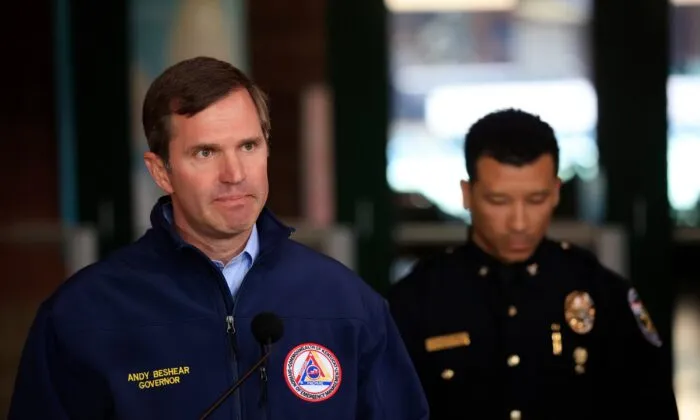A federal appeals court has ruled Kentucky must pay more than $270,000 in attorneys’ fees to plaintiffs who sued the state over Democratic Gov. Andy Beshear’s COVID-19 lockdown policies.
Plaintiffs Randall Daniel, TJ Roberts and Sally O’Boyle sued the Beshear administration in 2020 over orders they received to quarantine after they attended an Easter church service. The trio argued the administration had violated their constitutional rights.
In a legally complex decision, a federal court granted a preliminary injunction barring the Beshear administration from enforcing its lockdown policies against the churchgoers, and then dismissed the lawsuit against the Beshear administration as a moot issue. The plaintiff churchgoers subsequently sought attorneys’ fees in the case, but the Beshear administration fought the effort—arguing that the plaintiffs were not the prevailing legal party in the lawsuit.
“Three years ago today, [Beshear] told the people of Kentucky that they are not allowed to attend church during a Good Friday press conference. Beshear told the people of Kentucky that church goers will have their licenses taken down and they will be forced to quarantine, and face jail time. I ignored that order along with dozens of brave Christians and worshipped the Lord,” Roberts said in a statement on Monday. “Beshear followed through on these threats, so I called [attorney Chris Weist] and we sued the governor in federal court. Thanks to Chris, Tom Bruns, and Robert A Winter Jr., we won and the right to worship was affirmed in the 6th Circuit.
“Today, three years after these insane lockdowns, the governor owes my attorneys more than 272 Thousand Dollars, more than a quarter million tax dollars, for this case alone,” Roberts added.
“I know a lot of people who are outraged that the TAXPAYER is on the hook for ANDY’S constitutional violation,” Roberts wrote. “I share this outrage, but this outrage must be aimed at Beshear,” Roberts wrote. “If the people of Kentucky want to quit being taxed to pay for these court judgments, Kentucky MUST elect a governor who will actually follow the constitution.”
NTD News reached out to Beshear’s office for comment but did not receive a response before this article was published.
Kentucky’s Lockdowns
As COVID-19 cases began to emerge in the United States in early 2020, various state and local governments began advising people to remain at home and to practice social distancing, while declaring some business, cultural, and religious activities to be non-essential.
On March 19, 2020, Beshear issued an executive order (pdf) banning mass gatherings, “including, but not limited to, community, civic, public, leisure, faith-based, or sporting events; parades; concerts; festivals; conventions; fundraisers; and similar activities.”
On April 10, 2020, just two days before Easter, Beshear announced that authorities would be recording the license plates of people attending mass gatherings in the state. They would then turn the plate information over to local health departments, which would then visit people at their homes and present them with orders to quarantine for 14 days. Those receiving the quarantine orders would also be notified that their actions constituted a misdemeanor offense for violating Beshear’s COVID-19 executive orders.
“If you’re going to expose yourself to this virus and you make that decision to do it, it’s not fair to everybody else out there that you might spread it to,” Beshear said.
Daniel, Roberts and O’Boyle were among those individuals who defied Beshear’s quarantine warning and attended a service at the Maryville Baptist Church. After the trio filed their lawsuit, Beshear defended his lockdown decisions.
In his initial response to the lawsuit, Beshear said [50:37], “Here in Kentucky, there are so many different ways to worship, and all but one church in this commonwealth are engaged in them. You can do it virtually, and you can do it in a drive-in service, and in many states they are not allowing those drive-in services like we are. And so this opportunity to worship, which is so important, is still there. We just ask people to choose one of the versions that doesn’t spread the coronavirus, and I think that that’s what our faith calls us to do.”


